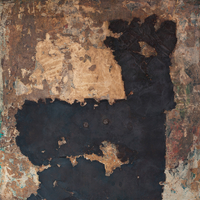To announce death engenders a whole universe of spells by Antonia always felt seduced. Death as the upper phase of a tragic pleasure. The pleasure of painting, first and for most, what hurts. After all, ataraxia is nothing but the fast and magnificent flight towards the sun to her. Probably an Icarus leap, an excessive desire for a pleasurable totality that possesses and abducts us fleetingly, despite the implicit inevitable fall.
Antonia Eiriz well knew the depths of immeasurable pain and tragedy. Perhaps this is why the eerie presence of misfortune appears in a large part of her production. But the artist understands misfortune as part of her ideological emancipation. Then, she recognizes the mortality in man as a logbook of frustrated passages, intervened by selected hardships: in the end, a sincere inhumanity.
In the midst of such temperamental storms, Ñica evades complacency to introduce in Cuban Art a tragic, more necessary vision of her worldview. “Someone squeezed a juice of black fruit in my soul,” would describe Dulce María Loynaz. Such juice, derived from the bitter ostracism handed to her by her context, deeply marked Antonia’s conception and selection of artistic alternatives. That’s why everything corrodes in Eiriz’s art, from the rusty air that her assemblages give off, to the squalid faces that emerge from the sketched characters. A whole catwalk of deaths announced along the way and which the artist cannot but perpetuate in the everlasting being of the artistic object. The individual, in her works, shows an angry narrowness that has its genesis in man’s own rejection towards a cognitive drowsiness that monsters him. Monsters that assault and embrace the whole scene that this artist builds/observes.
She understands that the road is full of them, and there may be too many that go unnoticed on the ride. Therefore, death stalks heartily when there are pious monsters. Antonia tries to spot them, she tries to paint them, but nothing is enough to draw the heavy curtain of a stubborn fear. It is not death she fears, because dying might even be the easiest of apologies; but the fog that blinds her, that blinds them all. Perhaps in doing so, Antonia, more than alluding to insinuated death, seeks to delve into the absence of life, humanity and tolerance that surrounds her.


